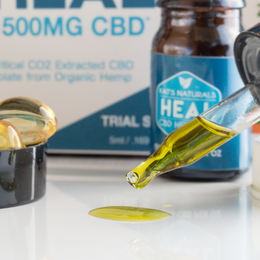
Entering the Mainstream
CBD products are poised to be the next big thing as more people seek natural alternatives to opioid medications, but are they safe and do they work?
Oxycodone, Tramadol, Imitrex, Topimax, Zoloft and Lexapro—Stef Smith took every drug out there for chronic pain, severe migraines, anxiety, PTSD and post-partum depression. Since surviving a car accident at age 18, the now 31-year-old Cherry Hill mother of two can’t remember the last time she had a day without pain—until she tried CBD.
“For my body pains, it’s like a weight was lifted off my shoulders. … It’s actually kind of weird because I’ve pretty much had pain my entire life, but when I use the CBD, I’m almost pain free. Something I’m not used to,” Smith says. Aside from the occasional Advil, CBD keeps her symptoms under control. “If I hadn’t tried CBD I would probably still be trying an obnoxious amount of different medications just to get minor relief and even worse side effects—I was on one medication that made me forget common words and have pins and needles in my hands and feet. It was horrible.”
Smith’s story is one becoming more familiar around the country and here in South Jersey as people turn to CBD (cannabidiol) products as a solution to their health woes. Available in everything from cosmetics, edible varieties, oils, creams and even dog treats—the CBD industry is exploding. Some analysts predict that CBD sales in the U.S. will reach $20 billion by 2024, much of it spurred by mainstream retail brands planning to offer the products on their shelves, including CVS, Walgreens, Ulta Beauty and Martha Stewart.
But even as a growing number of people seek out an alternative to opioids, CBD products remain unregulated by the Food and Drug Administration (FDA)—except for one, Epidiolex, a drug approved for treatment of epilepsy—and little research exists to back the claims made by CBD manufacturers. “CBD is one of those compounds that has gained interest in the marketplace for consumers and whenever there is a new ‘miracle’ substance, whether it’s an anti-oxidant or superfood, the buzz gets out and the marketplace follows,” says Paul Josephson, partner at Duane Morris and member of the firm’s Cannabis Industry Practice Group. “But there are concerns from a regulatory perspective about both the nature of the product, its safety, effectiveness and how it’s being marketed.
“Like any other product, consumers need to ask a lot of questions and do their homework about CBD products—the source of the CBD, where it’s being manufactured. Right now it’s very much a regulatory Wild West,” he continues.
What is CBD?
To be clear, cannabidiol (CBD) is not medical marijuana, as is the misconception by some. CBD is derived directly from the hemp plant, and while it is a component of marijuana, CBD alone does not cause a “high.” Hemp plants contain less than 0.3 percent THC, the psychoactive compound in marijuana.
Its prevalence lately is due in large part to the Farm Bill. Hemp was illegal to grow or sell in the U.S. until the Farm Bill was signed into law in 2018. A provision in the law legalized hemp, shifting the ground and making it clear that the federal government would not consider hemp a schedule I controlled dangerous substance, says Josephson. With those restrictions lifted, it cracked the CBD market wide open.
However, CBD does not have approval as a prescription drug or dietary supplement, meaning doctors cannot write prescriptions for it, and the FDA reserves its authority over any claims made by manufacturers about CBD’s therapeutic benefits.
“The most important question when it comes to the regulatory status of CBD is, ‘Does the FDA call it a drug?’” Josephson says. “It’s a matter of ongoing regulatory review and the FDA held hearings in late May to gather comments from the public. Although it has not rendered a decision, the FDA leans toward considering it a drug and had stepped forward, issuing cease and desist orders to companies that are marketing it with excessive health claims not supported by research.” He says this includes claims that it can relieve chronic pain, reduce symptoms of anxiety or ADHD, or that it’s effective in treating Parkinson’s.
“It doesn’t take much, once you start making those claims,” Josephson continues. “And when you talk about infusing CBD into something edible, now you’re adulterating a food product and that’s a whole separate category of regulatory concern for the FDA.”
If CBD does ultimately fall under FDA regulation, manufacturers will have to do what any other drug company does. “They will have to conduct trials and submit to a years’ long process of demonstrating the efficacy, safety and effectiveness of the CBD they are selling,” he says, adding that a legal gray area would exist and it’s not clear if the products would be required to come off the shelves while trials are underway.
CBD’S Impact
Despite the lack of regulation, the life-changing stories of CBD are all around, and there are medical professionals who see it as beneficial— but only as one component of care.
Among her patients, Kavita Gupta, DO, of Advocare Pain Institute of South Jersey has recommended CBD to those experiencing anxiety, depression, degenerative joint syndrome, as well as for those with migraines, headaches or suffering from insomnia. But it would not be the only course of treatment.
CBD works by attaching to cannibinoid receptors that already exist in the body, helping to modulate and influence things such as mood, sleep and inflammation. “Pain is modulated by so many things. If you are not sleeping well, it leads to irritability or a bad mood, or it can amplify pain you already have in your body. I never recommend CBD as a painkiller or for pain relief because it sets an expectation. I recommend it like a supplement to the pain relief regimen you are already doing. You don’t use it in lieu of Tylenol, but it can help,” she says.
Of course, what works for one person might not work for another, she adds. CBD’s effectiveness depends on the quality of the CBD, the dosage, how it’s being taken— oil, capsules or edibles— and how long it takes for your system to respond.
The decision to introduce CBD into her body wasn’t made overnight, says Smith. Her postpartum symptoms got to a point where marijuana seemed like an option to consider, but she was too nervous about it. When a friend of her husband’s mentioned CBD oil, she did research—a lot of it. “I’m not one to just jump in and try something without knowing everything there is to know about it,” she says. She also discussed it with her doctor. “Luckily he was pretty familiar with it and together we decided that it would be a good idea for me to try it, given all of my symptoms.”
Kimberly Knowland took the same approach, only she didn’t plan on using the CBD herself. She wanted to see if it would help her son, Michael, who has autism. Diagnosed before age 2, Michael became almost non-verbal, would spin and hum, and within the last year, he developed food sensory issues, causing him to gag whenever food was placed near him.
Michael has been through early intervention and years of occupational and speech therapy, says Knowland, who lives in Moorestown. She had heard about CBD, researched it, discussed it with Michael’s pediatrician and therapists for years, but she always felt like he wasn’t old enough. When Michael’s gagging seemed to get worse—he would even gag when Knowland was eating—it was the turning point to try it. “I was worried; he already had a limited diet and I thought he might develop an eating disorder, and I was scared honestly because you never know how it can affect someone. Everyone’s different,” she says.
She found a 100 percent THC-free CBD oil and about four months ago, began giving Michael, now 7, a half dropper in his mouth daily. “I was watching him the first week and didn’t see a huge difference. I
said we would give it time, let it build up,” Knowland says. “Then, we went to his IEP meeting two weeks later and his occupational therapist said he had been really focused in those weeks and talked about how well he was doing. She didn’t even know until then that we had been giving him CBD.”
Michael’s gagging has stopped completely, she says, and he’ll even try new foods, but the biggest change has been in the sensory area. “If we skip a day we notice immediately. He starts flicking his fingers, has a hard time sitting still,” she says. “When he has the CBD, it calms him, like the sensory isn’t overcoming his entire body. He has always been a happy kid and now he enjoys life.”
As Michael begins second grade this month, Knowland will continue giving her son the CBD daily. “I know what it’s like as a parent to feel helpless and frustrated. I never wanted to medicate him with anything unless he was harmful to himself or others,” she says. “This is almost like a vitamin. We give it to him before school and he has a productive day. I want him to thrive. Who am I to prevent that?”
It’s not just humans whose quality of life is improving with CBD. Martha Stewart and Willie Nelson are just two of the names getting in on this wellness trend for pets. Sheila O’Connell’s 14-year-old dog Callie suffers from her share of health issues, many of which are attributed to being a senior dog. O’Connell, of Medford, says Callie has arthritis, anxiety and neuropathy and takes Rimadyl and Trazodone to help treat these conditions. When her groomer in Haddonfield noticed Callie’s joint issues, she told O’Connell about the CBD products she was selling for pets. O’Connell thought, “Why not try it?”
The CBD oil is dropped onto Callie’s food twice a day and she has never turned her nose up at it, says O’Connell. “We’re very happy with the way CBD has helped ease her pain and allowed her to be more mobile. She is able to get up and walk outside on her own,” she says. “She used to wake up in the middle of the night wanting to get out of her crate, she was restless. Now she sleeps through the night. She is much calmer and has really helped the anxiety.”
O’Connell says she does not plan on stopping the other medications for Callie. “I feel like with her having CBD oil, it actually helps to enhance the other medications she’s on. Because she’s older, we’re willing to do whatever it is to make her life comfortable and we have found something that works,” she says.
What do you think — IS CBD THE REAL DEAL OR JUST A BUNCH OF HYPE?
We want to hear from you. Email your feedback to Editor@SouthJersey.com or visit us on Facebook.
What do you think — IS CBD THE REAL DEAL OR JUST A BUNCH OF HYPE?
We want to hear from you. Email your feedback to Editor@SouthJersey.com or visit us on Facebook.
To read the digital edition of South Jersey Magazine, click here.
Published (and copyrighted) in South Jersey Magazine, Volume 16, Issue 6 (September 2019).
For more info on South Jersey Magazine, click here.
To subscribe to South Jersey Magazine, click here.
To advertise in South Jersey Magazine, click here.












